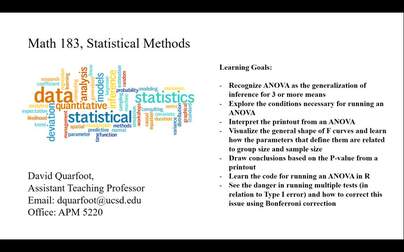Math 183 ucsd
All courses, math 183 ucsd, faculty listings, and curricular and degree requirements described herein are subject to change or deletion without notice. For course descriptions not found in the UC San Diego General Catalog —24please contact the department math 183 ucsd more information. All prerequisites listed below may be replaced by an equivalent or higher-level course.
Dimitris Politis Email: dpolitis ucsd. Alex Brik Email: abrik math. Walter Faig Email: wfaig math. Every Friday, a 20 minute quiz will be given. The quizes are a most important part of the class; they will focus on the examples discussed in class as well as the most recent homework that was handed-in and discussed in the last section. Quizes can not be made up if missed; however, the two lowest quiz scores will be dropped before calculating the quiz average for the final class grade.
Math 183 ucsd
.
MATH 99R. Eigenvalue and singular value computations. Formulation and analysis of algorithms for constrained optimization.
.
All courses, faculty listings, and curricular and degree requirements described herein are subject to change or deletion without notice. The mathematics department offers a wide range of courses in pure and applied mathematics for its majors and for students in other disciplines. The department offers six majors leading to the BS: mathematics, applied mathematics, mathematics—computer science, joint major in mathematics and economics, mathematics—applied science and probability and statistics, and one leading to the BA: mathematics—secondary education. In addition, students can minor in mathematics or mathematics education. The department also has an Honors Program for exceptional students in any of the eight majors. See the sections on major programs and the other areas mentioned above as well as the course descriptions at the end of this section for more specific information about program requirements and the courses offered by the department. Students need to ensure that test scores and transferable college credit are submitted to the Registrar prior to enrollment through TritonLink. The students in this sequence have completed a minimum of two years of high school mathematics.
Math 183 ucsd
All courses, faculty listings, and curricular and degree requirements described herein are subject to change or deletion without notice. For course descriptions not found in the UC San Diego General Catalog —24 , please contact the department for more information. All prerequisites listed below may be replaced by an equivalent or higher-level course. The listings of quarters in which courses will be offered are only tentative.
Blue book value of snowmobiles
Calculus II 4 Integral calculus of functions of one variable, with applications. Topics include linear transformations, including Jordan canonical form and rational canonical form; Galois theory, including the insolvability of the quintic. Topics in algebraic and analytic number theory, such as: L-functions, sieve methods, modular forms, class field theory, p-adic L-functions and Iwasawa theory, elliptic curves and higher dimensional abelian varieties, Galois representations and the Langlands program, p-adic cohomology theories, Berkovich spaces, etc. Continued development of a topic in real analysis. Renumbered from MATH A variety of advanced topics and current research in mathematics will be presented by department faculty. Analysis of Partial Differential Equations 4 A rigorous introduction to partial differential equations. This course covers analysis of numerical methods for linear algebraic systems and least squares problems. Hypothesis testing, including analysis of variance, and confidence intervals. Vector geometry, vector functions and their derivatives. An introduction to the basic concepts and techniques of modern cryptography. Topics include principal component analysis and the singular value decomposition, sparse representation, dictionary learning, the Johnson Lindenstrauss Lemma and its applications, compressed sensing, kernel methods, nearest neighbor searches, and spectral and subspace clustering. Combinatorial applications of the linearity of expectation, second moment method, Markov, Chebyschev, and Azuma inequalities, and the local limit lemma. Sparse direct methods.
This course will cover the foundations of statistical thinking. The objective of the course is to introduce students to the fundamental importance of statistics in various fields, and equip them with the tools necessary to interpret, analyze, and make informed decisions based on data.
May be taken for credit six times. Conservative fields. Cross-listed with EDS A. Completion of courses in linear algebra and basic statistics are recommended prior to enrollment. Calculus II 4 Integral calculus of functions of one variable, with applications. Mathematical Methods in Data Science I 4 This is the first course in a three-course sequence in mathematical methods in data science, and will serve as an introduction to the rest of the sequence. Introduction to algebraic geometry. Topics include the real number system, basic topology, numerical sequences and series, continuity. Introduction to Cryptography 4 An introduction to the basic concepts and techniques of modern cryptography. Probability Theory I 4 This is the first course in a three-course sequence in probability theory.


What entertaining question
Yes, I understand you.
I think, what is it � error. I can prove.